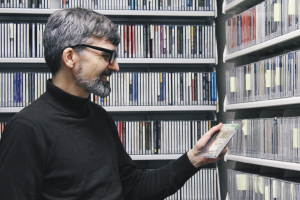Turn an ear to podcast host and radio broadcaster Michael Toulouse and you’ll make a personal connection with classical music.
Words by Crystal Hammon.
As regional celebrities go, it’s hard to find a more self-effacing personality than Michael Toulouse, host of Classical Music with Michael Toulouse. The calm, baritone voice that guides thousands of Hoosiers through classical music on his syndicated radio show, airing throughout Indiana, is practically synonymous with the classical music genre.
“Michael Toulouse has become the most recognized on-air voice of classical music in Indianapolis,” says Glen Kwok, executive director of the International Violin Competition of Indianapolis. “He has entertained millions of listeners throughout the years with his insightful and engaging conversations, including worldwide audiences tuning into the live broadcasts of our quadrennial violin competitions.”
After four decades of broadcasting, Toulouse has a loyal fanbase and the respect of some of the best-known names in classical music, but he remains a cultural outlier, uncomfortable with self-promotional norms like the humble brag. “Anything I’ve achieved with this organization would never have been possible without the support of people like the late P.E. McAllister and other people who give whatever they can,” says Toulouse, referring to Classical Music Indy’s donors.
Sharing classical music on the radio has been part of Toulouse’s life since college days, and he is excited about all the new ways people can encounter classical music. “Part of our mission is to find the various ways we can reach listeners with the power of classical music,” he says. At CMI, that includes creating podcasts like Key Principals, a show that highlights Toulouse’s interviews with notable conductors, composers and musicians.
Toulouse loves the freedom Key Principals gives him to cover a topic until it’s done rather than making it fit into radio’s precise time slots. “When I interview an artist who performs in a very traditional medium—say a Romantic opera, or Mozart opera or piano concerto repertoire—I like to ask questions that reveal something about their unique situations, and how that influences their interpretation of music,” he says.
The roots of a classical music broadcaster
Toulouse grew up in Moorhead, Minnesota, where he listened to classical music on the formidable public radio system that broadcast it in his home state. Enrolling at Saint John’s University in Collegeville, Minnesota, he declared music literature as a major, not knowing exactly how he would apply it. He considered a career as a church music director, but that idea never launched. “The really skilled church musicians were always good organists,” Toulouse says. “I had no experience playing the organ, and only a little experience with piano.”

His first taste of broadcasting came through a student internship at the on-campus Minnesota Public Radio station, and by Toulouse’s 1987 graduation, a career in classical music radio programming was cinched. “I made up my mind that I would apply to as many stations as I could find that had openings for classical announcers,” he says. WBNI in Fort Wayne gave Toulouse his first broadcasting job right out of college. He stayed until 1991, then moved to WUOL in Louisville, Kentucky before landing in Indianapolis at WFYI as an evening classical music host in 2002.
Listening habits among audiences have changed, but after all these years, Toulouse finds the job as stimulating as it ever was. What keeps it fresh? “For me, it’s a daily experience of realizing my own ignorance, and trying to encounter new things,” he says. “The more you know, the more you realize you don’t know. You can always find areas where there’s more to learn.”
Every year there’s an influx of artists to keep him inspired. “It’s always exciting to come across new artists who have fresh interpretations of what we think of as the classics,” Toulouse says. “And it’s very exciting to hear new voices among young composers, whether it’s composers that we [Classical Music Indy] have worked with, like Rob Funkhouser, or the composers who are making names for themselves internationally.”
Making music personal
Whether Toulouse is narrating a broadcast of the International Violin Competition, interviewing a musician, or coaxing appreciation for a difficult piece of music at a pre-concert talk, he maintains an attentive, one-to-one rapport with his audience. “When you’re communicating about music, you’re building a relationship with the listener, so it’s personal,” he says. “As I speak into the microphone, I want people to have the sense that I am talking directly to them, that I’m a companion, listening along with them.”
Toulouse approaches his craft with discipline. Behind every syndicated show are hours of research, programming, script writing and editing, with support from Janice Roger, a Classical Music Indy board member. Anything less would be, in his view, a slight to people who’ve dedicated their lives to the rigors of mastering classical music.
One of his favorite tasks is hunting for hidden details that may captivate listeners. “I’m interested in communicating stories without boring people,” he says. “I really try to say something original about the music that’s going to help people get a little more enjoyment out of what they hear.”
 His respect for the audience, the music, and the people who make it, is clearly reciprocated. A few weeks before his death in 2019, Raymond Leppard, conductor laureate of the Indianapolis Symphony Orchestra, gave Classical Music Indy the nod to be interviewed. Having Toulouse in the interviewing seat made that plausible, according to Jenny Burch. “Michael has a reputation as someone who really knows his stuff,” says Burch, CEO of Classical Music Indy. “That opens doors and gives us access to some of the most interesting and important people in classical music.”
His respect for the audience, the music, and the people who make it, is clearly reciprocated. A few weeks before his death in 2019, Raymond Leppard, conductor laureate of the Indianapolis Symphony Orchestra, gave Classical Music Indy the nod to be interviewed. Having Toulouse in the interviewing seat made that plausible, according to Jenny Burch. “Michael has a reputation as someone who really knows his stuff,” says Burch, CEO of Classical Music Indy. “That opens doors and gives us access to some of the most interesting and important people in classical music.”
A servant’s mindset
Key Principals was originally conceived as a show that would draw guests from visiting musicians who were performing in Indianapolis. With many concerts and performances postponed due to the corona virus, Toulouse plans to adapt content around other prompts such as new recordings.
The pandemic has underscored one of Toulouse’s personal mantras: never, ever take the audience for granted. “The virtual performances that have been happening the past few weeks are among the only resources for people who are seeking music,” he says. “Before [the pandemic], they knew they had a concert or several concerts to look forward to. When all those concerts went away, we became a much more important source for them. We feel an obligation to serve people in this situation.”
Toulouse says the arts can play a major role in helping people recover from this crisis. “In my opinion, there needs to be more than just a physical healing,” he says. “There’s a lot of emotional and psychological healing that needs to happen, too.”







Leave a Reply